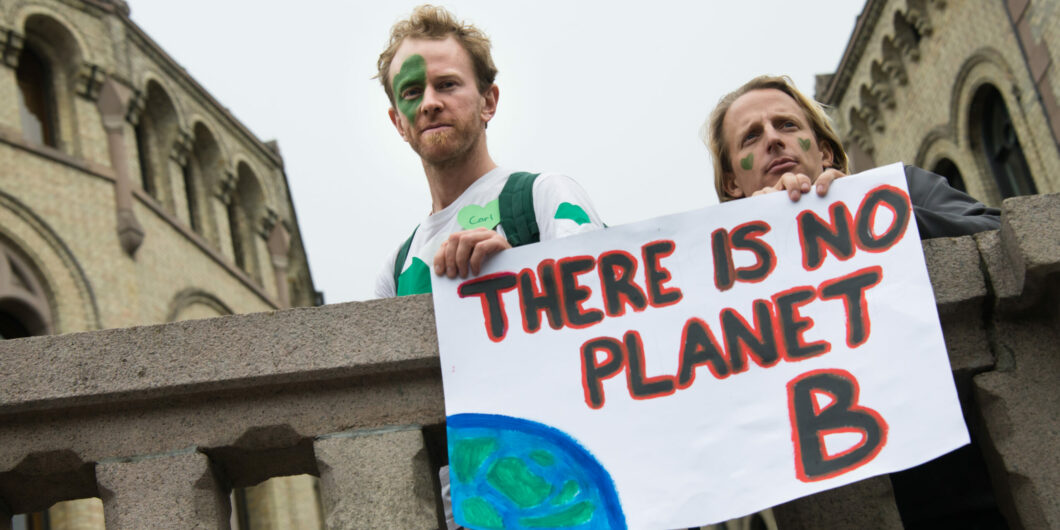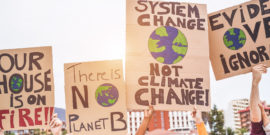The assumption that humans are the single most significant cause of climate change is unsupported by the available science.
Classical Liberalism vs. "Climate Liberalism"
In an EconTalk discussion, MIT climatologist Kerry Emanuel, author of What We Know About Climate Change, remarked: “If I’d written a book called What We Don’t Know about Climate Science, it would have been an encyclopedia.” Emanuel added in regard to climate models:
I actually share with [opponent] John [Christy] an inherent distrust of complicated models. I don’t like them particularly. It’s one of the necessary evils.
Welcome to the physical science debate. It has been 35 years since James Hansen’s historic testimony about anthropogenic global warming before Congress in 1988. The overriding uncertainty is climate sensitivity to carbon dioxide (CO2) and other man-made greenhouse gases, which together produce the enhanced greenhouse effect.
Is anthropogenic warming small or large? What are the offsets, such as those from sulfate aerosols? High-sensitivity model estimates, predicated on a simplistic treatment of the feedback effects that amplify the initial warming, are being challenged by data from airborne measurements, in particular, that support global lukewarming (see also here). Cloud behavior and the indirect effects of climate drivers remain in hot debate.
That aside, there is some relatively settled science that frames the downstream analysis of economics and public policy. Four points are:
- The Greenhouse gas (GHG) “signal” is weighted toward winter, night, and high latitudes, not summer afternoons (so much in the news today);
- GHG forcing is logarithmic, not linear, meaning that the warming from a doubling of CO2 (equivalent) is not repeated at a tripling but at a quadrupling;
- Public policies today will not measurably affect climate for decades because of climate inertia;
- CO2 science, based on controlled experiments, verifies the positive effect on plant life (along multiple dimensions) from increased atmospheric concentrations of CO2.
Unknown climate sensitivity, a relatively benign distribution of warming, diminishing warming per unit of emissions, present costs versus distant and uncertain benefits, and CO2 fertilization have influenced classical liberals since the beginning of the debate. In fact, CO2 has positive externalities, from incremental warmth to global greening. Milton Friedman endorsed Thomas Gale Moore’s Climate of Fear: Why We Shouldn’t Worry About Global Warming, making the point that “global warming is more likely to benefit than to harm the general public.”
The above scientific basis was established by the early 1990s by Patrick Michaels (et al.) for the Cato Institute. Classical liberalism drew upon a case for climate optimism to formulate a do-no-harm policy perspective. William Niskanen, for one, devised a checklist putting the burden of proof on government intervention, not free markets.
A quarter-century ago, the climate-science-to-economics debate was informed by a bottom-up approach by Yale environmental economist Robert Mendelsohn. In one book, he tasked agricultural, energy, water, forestry, and recreational specialists to assess the costs and benefits for a middle estimate of anthropogenic warming out to 2100 and found a benign-to-positive overall effect for the U.S.
Globally, Mendelsohn found benign-to-positive results for industrial (free market) economies relative to less developed (statist) economies. The ability to endure and adapt suggests the importance of a thoroughgoing classical liberal policy.
In Mendelsohn’s primer The Greening of Global Warming, he challenged the deep ecology notion of nature as optimal and the human influence as per se bad. He criticized alarmist scenarios that failed to incorporate adaptation, where costs are internalized over time by rational decision-making. Regarding policy, he warned against expensive abatement (mitigation) policies and the problems of international agreements to this end.
Mendelsohn identified “winners” and “losers” from the human influence on global climate. His cost estimate to compensate losers was modest (a present value of several billion dollars).
Historical perspective has also informed the climate debate for multi-disciplinary classical liberalism. Climate angst did not begin in the unusually hot summer of 1988. Nor did it begin with the earlier concern about global cooling. In Historical Perspectives on Climate Change, James Rodger Fleming stated:
Climate apprehensions did not begin in 1988 or in 1957, or even in 1896. There were colonial, early modern, and even ancient precedents. From a climate discourse steeped in the tradition of literary analogy, … we have arrived, late in the twentieth century, at a climate discourse that is again saturated with metaphor, values, and apprehensions.
The historical record is replete with newspaper stories and expert opinions of climate scares in different directions and for different reasons. Broadly speaking, today’s climate alarmism is best understood as a continuing consensus about too many people living in modernity, a theme documented in Desrochers and Szurmak, Population Bombed!
Classical liberals have been suspicious of government intervention to “stabilize” climate, whether by penalizing consumer-chosen, taxpayer-neutral energies (primarily fossil fuels) or by discouraging demand. F. A. Hayek’s “fatal conceit” and Ludwig von Mises’s interventionist thesis converge to identify Al Gore’s “central organizing principle for civilization” as a pre-ordained road to serfdom. Washington D.C.’s “whole-of-government” approach to the “existential threat” of climate change speaks for itself.
Classical-liberal climate policy is based on economic freedom, not governmental planning of energy and land use, country by country and globally. This position can be summarized as:
- “No regrets” free-market actions that reduce government intervention and GHG emissions.
- Rejection of government intervention designed to mitigate anthropogenic GHG emissions.
- Primary reliance on free-market adaptation, including greater economic freedom to enhance the adjustment process.
- Secondary reliance on civil society to address here-and-now issues related to weather/climate, including relief and “compensation.”
Far from “do nothing,” the above is studied and proactive. It is positive for consumers, taxpayers, economies, the environment, and international peace and prosperity. And it avoids “expert” planning and rent-seeking by the climate-industrial complex.
Classical liberalism is not confounded or refuted by the climate issue. Freedom’s prosperity is the way forward in an uncertain world—and climate policy par excellence.
The above background sets up a critical look at an anthology edited by Jonathan Adler, Climate Liberalism: Perspectives on Liberty, Property and Pollution (recently reviewed here at Law & Liberty). All but a few of the 14 contributors present “liberal” perspectives that are at odds with classical liberalism.
The book assumes rather than debates alarmist climate science. Proactive government is thus justified in terms of “market failure” with the market guilty before trial.
The anthology does not define its most important term, pollution. Carbon dioxide (CO2) is quite different from the criteria air pollutants: ground-level Ozone (O3), Particulate Matter (PM), Carbon Monoxide (CO), Lead (Pb), Sulfur Dioxide (SO2), and Nitrogen Dioxide (NO2). A dangerous concentration of CO2 (such as might occur in a confined space) would be a multiple of the current ambient levels of 420 ppm. CO2 is a politically designated pollutant, making much of Adler’s tome a non sequitur for those seeking classical liberal solutions to weather extremes or “climate change.”
Many authors support pricing CO2, whether through a carbon tax or a cap-and-trade program. Given the global nature of such emissions, domestic pricing must be accompanied by regulating international trade with “border adjustments” (tariffs, quotas). But no author chooses to venture there.
Imagine 190 nations setting tariffs on CO2-intensive goods, creating quadrillions of pricing interrelationships, all subject to Hayek’s “knowledge problem” and to raw politics. Only by ignoring or dismissing key principles of classical liberalism can the case for climate activism proceed as a (necessary) global program.
Special mention should be made about Jonathan Adler’s invocation of tort law to compensate victims of climate change. Such judicial activism is problematic.
Can science differentiate anthropogenic from natural influences, allowing some to sue many for damages? If so, when did the science become clear about the particulars? If the “damage” was decades in the making, are the alleged victims to be excused for failing to adapt? If statism itself prevented a partial or total solution, who is the guilty party?
Who are the perpetrators of the alleged crime? Fossil-fuel users (including the plaintiffs themselves)? The companies that produced the products? The professors or universities that trained the fossil-fuel finders (“resources come from the mind, not the ground”)?
Since much of the world’s fossil fuels are under government ownership and/or management, can sovereign entities be sued and enjoined?
A classical liberal perspective would demur at unbridled judicial activism and let civil society judge and prioritize the nature of the alleged problems. One example in Adler’s book is a climate-related village relocation costing $150–$200 million. For cents on their dollar, the private foundations now pushing climate activism (Pew, Rockefeller, Heinz, Gates, etc.) could address the incremental harm from climate change, as subjectively perceived.
Roads to freedom offer an alternative to a climate road to serfdom. Climate science offers reasons for optimism about a CO2-enriched, moderately warmer world. Free economies promise to capitalize on the positives and ameliorate the negatives of anthropogenic change. Robust civil society is poised to address weather extremes and unique situations, whatever the direction and the cause.
Redefining, violating, or twisting classical liberalism to comport with an assumed problem is unnecessary and counterproductive. Classical liberalism is not confounded or refuted by the climate issue. Freedom’s prosperity is the way forward in an uncertain world—and climate policy par excellence.

